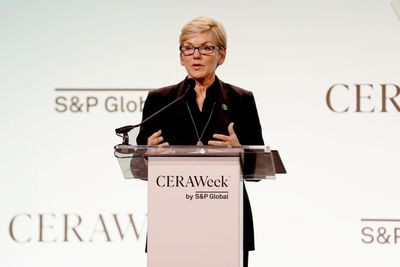keynote address
DOE announces geothermal initiative, community-focused pilot at Houston energy conference

U.S. Secretary of Energy Jennifer M. Granholm made two big announcements at her CERAWeek address. Photo via Jennifer Granholm/X
The Department of Energy announced two major initiatives at U.S. Secretary of Energy Jennifer M. Granholm's address earlier this week at CERAWeek by S&P Global.
The first announcement Granholm revealed on Monday, March 18, at her keynote address was the DOE's latest Pathways to Commercial Liftoff report, which are initiatives established to provide investors with information of how specific energy technologies commercialize and what challenges they each have to overcome as they scale.
"We develop these Liftoff Reports through a combination of modeling and hundreds and hundreds of interviews with people across the whole investment lifecycle—from early-stage capital to commercial banks and institutional investors," Granholm says in her address.
The DOE has released eight already, and the ninth — and Granholm's favorite, she says — is on geothermal energy.
"Geothermal has such enormous potential. If we can capture the 'heat beneath our feet,' it can be the clean, reliable, base-load scalable power for everybody from industries to households," she says.
Geothermal development requires similar skills and infrastructure to traditional oil and gas, meaning the transition should be smooth, she explains, adding that the market is huge for geothermal.
"At scale, this market is significant: We're talking about at least—at least—a $250 billion investment opportunity to meet the goal that we have of 90 gigawatts of capacity by 2050," she remarks.
Granholm's address shifted into acknowledging the negative impact on communities the energy industry's history is paved with. She emphasizes how each of the Biden Administration's laws passed — like the Inflation Reduction Act and the Bipartisan Infrastructure Law — implemented requirements and incentives with communities in mind.
The administration's next initiative, and Granholm's second big announcement, is "to empower communities to build their energy future."
Regional Energy Democracy Initiative, or REDI, as Granholm describes, will "bring together companies, and community groups, and academic institutions, and philanthropy to weave equity and justice into DOE-funded clean energy projects."
The inaugural pilot will be in the Gulf South across Texas and Louisiana. She says the DOE plans to award over $8 billion to regional carbon reduction and clean energy infrastructure projects.
"These structures will provide capacity building, technical assistance to help communities match their most pressing needs with the biggest opportunities…to design and to implement Community Benefits Plans," Granholm says, "in short, really to have a say in how the historic clean energy investments in their backyards are going to benefit their people."
Granholm also noted on the progress of the clean energy sector, including how clean energy investment is three times what it was in 2018 and that in 2024, wind and solar energy in the U.S. is expected to outpace coal generation for the first time.
All this progress, Granholm explains, in light of global events and global energy supply disruption
"But our work together really has to extend beyond crisis management," she says. "Because the sooner that we acknowledge this transition for what it is—an undeniable, inevitable, and necessary realignment of the world’s energy system—the sooner we can capitalize on this incredible opportunity."